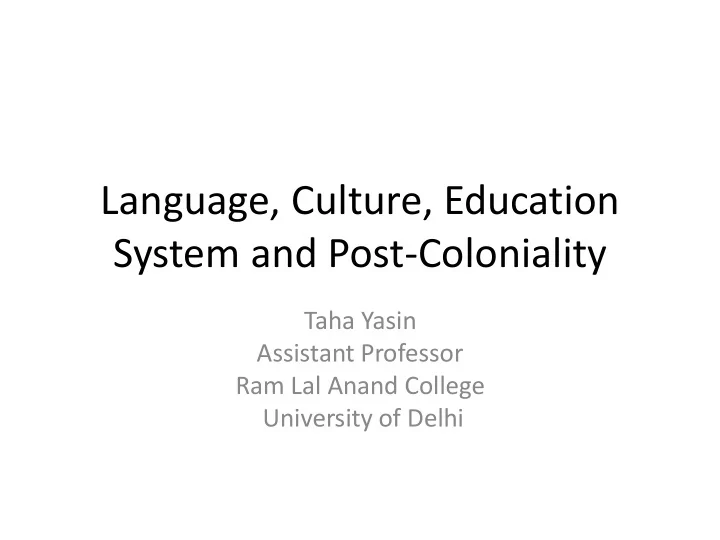

Language, Culture, Education System and Post-Coloniality Taha Yasin Assistant Professor Ram Lal Anand College University of Delhi
Ngugi wa Thiong’o (born 5 Jan 1938) Aijaz Ahmad (born 1932)
Language as Communication (3 aspects) Language of real life (drawing from Marx) Relations people enter into with one another in labour process (for existence) Production is co-operation, is communication, is language, is expression of a relation between human beings and it is specifically human. Speech Imitates language of real life Makes production possible Written Signs imitates the spoken Where the first two evolved simultaneously, the written aspect is a much later development
Culture • Culture embodies those moral, ethical and aesthetic values, the set of spiritual eye glasses, through which we come to view ourselves and our place in the universe Language as Culture (3 aspects) 1. Culture is a product of history – or a product and reflection of human beings communicating with one another 2. It is an image forming agent in the mind of a child 3. A specific culture is not transmitted through language of another. Thus communication creates culture and culture is a means of communication Culture is indistinguishable from the language that makes possible its genesis, growth, banking, articulation and indeed from one generation to the next
Post-Coloniality • Mother Tongue = Means of Communication + Carrier of Culture In non-colonised societies: • Written and Spoken languages are same. Ex English for Britishers • Can be read and received by both the parties as that language which the recipient has grown up speaking • There is a broad harmony for a child between the three aspects of language as communication • The association of the child’s sensibility is with the language of his experience of life In Colonial societies: • The real motive of colonialism was to control people’s wealth, that is the entire realm of language of real life • Thus colonialist imposition of foreign language – to destruct and deliberate undervaluing of people’s culture, and consciously elevate the language of coloniser.
Result of colonialist imposition of language • Harmony between the three aspects of language is broken • Spoken and Written now does not reflect the language of real life of a colonised nation • Learning for a colonial child becomes a cerebral activity and not an emotionally felt experience Spoken i.e. native language still persisted but written became the coloniser’s domain • Lang. of formal education – foreign • Lang. of book he reads – foreign • Lang. of conceptualization – foreign • Dual life between school and home “Colonial Alienation” – the resultant disassociation of the sensibility of a child from his natural social environment (Eurocentric – Europe the great mirror of imagination)
Eurocentrism • The colonial child was being made to stand outside himself to look at himself (in the lang. of imposition) • In his autobiography “This Life” Sidney Poitier describes how as a result of literature he read, he had come to associate Africa with snakes • It becomes much more problematic when it internalizes our psyche and becomes a natural choice at times (unassailable position of English in our literature)
Indian Languages and Indian Universities Difficulty in constructing a category ‘Indian’ Literature: • Spread over many languages with histories of very uneven development • State boundaries which have historically contained these literary productions have been shifting through all the centuries • Culture and literature are not necessarily coterminous with linguistic formation and state boundary Institutionalized and systematic effort over the machinery of translation is poorly developed • Indian University system lacks public institutions for overlapping translations
Translation Mechanism • The tradition of circulating texts through various linguistic communities of India by means of mutual translations, without the mediation of English, is weakly developed, and is rarely accessible to readers outside a particular lingguistic community • Meanwhile it is in English more than any other language that the largest archive of translations has been assembled so far; if present trends continue, English will become, in effort, the language in which the knowledge of ‘Indian’ Literature is produced • And English is least able to bridge the cultural gap between the original and translated text
Let’s learn and teach our respective mother tongue and prevent it from vanishing altogether. Let’s struggle against the politics of power and hierachization of languages Thank You !!
Recommend
More recommend